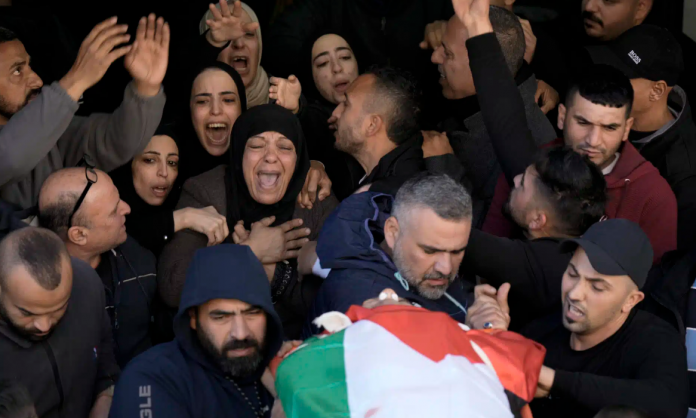Israeli occupation forces carried out a four-hour killing spree in the Jenin refugee camp in late January that left ten dead, including a 61-year-old woman, Majda Obaid, and two teenagers. Their killers arrived in a cheese truck. Before departing, they fired tear gas at a nearby hospital, leaving children choking and coughing.
Israeli state violence has killed 36 Palestinians in the first month of 2023 and at least 220 last year, 48 of whom were children. The latest attack is part of a nine-month military campaign that has targeted Palestinian militants in the West Bank cities of Jenin and Nablus.
US Secretary of State Anthony Blinken visited Jerusalem just four days after the attack and reaffirmed Washington’s role as the number one sponsor of Israeli state terrorism.
In a speech given alongside Israeli Prime Minister Benjamin Netanyahu, Blinken declared his government’s “ironclad” commitment to Israel. The US funds Israel’s military to the tune of US$3.8 billion each year.
Blinken expressed his “condolences” to the families of seven Israelis killed in what he described as a “horrific terrorist attack” outside a synagogue on the outskirts of East Jerusalem. The attack was carried out by 21-year-old Alqam Khayri, a lone Palestinian gunman, in reprisal for the Jenin massacre the previous day.
Blinken made no mention in his speech of the Palestinians killed in Jenin. Nor did he mention the many more killed over the preceding year, including Shireen Abu Akleh, an Al Jazeera journalist shot dead by Israeli snipers, and Omar Assad, an 80-year-old Palestinian-American who suffered a heart attack in Israeli custody.
Since 2020, under US sponsorship, the United Arab Emirates, Bahrain, Sudan and Morocco have signed agreements to normalise relations with Israel. Such normalisation, Blinken insisted, “helps chip away at enduring biases and mistrust” and paves the way for “Palestinians and Israelis enjoying equal measures of freedom, security, opportunity, justice, and dignity” in two states.
Palestinians see things differently. Netanyahu and his ministers avowedly oppose a Palestinian state, and the normalisation of their colonial apartheid regime only entrenches Palestinian inequality, injustice and dispossession.
Blinken declared that Israel and the US shared “support for core democratic principles and institutions, including respect for human rights, the equal administration of justice for all, the equal rights of minority groups, the rule of law, free press, a robust civil society”.
Again, Palestinians have many reasons to disagree. Among the “democratic principles” currently on display in Israel are the besieging of Palestinian neighbourhoods in East Jerusalem, the sealing and demolition of Palestinian militants’ family homes and the issuing of gun permits to Israeli settlers to enable them to carry out vigilante attacks.
Since Israel’s most right-wing government in its 75-year history came to power in December, National Security Minister Itamar Ben-Gvir has directed police to ban the display of Palestinian flags and initiated a purge of public sector employees with sympathy for the Palestinian cause. Ben-Gvir has also launched a crackdown on the rights of Palestinian prisoners. They will no longer be able to occupy cells adjacent to comrades from the same faction, sing Palestinian anthems or bake traditional flat bread.
Israel is “the national state, not of all its citizens, but only of the Jewish people,” proclaimed Netanyahu in 2019. Now he leads a government determined to put this Jewish-supremacist policy into effect. Netanyahu’s cabinet colleagues include not only Ben-Gvir, a convicted terrorist, but also Bezalel Smotrich, an open homophobe and leader of the Religious Zionism bloc in the Israeli Knesset.
Another elected on the Religious Zionism list is Avi Maoz, who leads the ultranationalist Noam party. In December, Israeli news site Ynet published two blacklists reportedly drawn up by Noam staff. One list identifies prominent LGBTQ and feminist journalists, researchers and public educators. The other names officials, academics and even interns who were involved in a civil society workshop that Maoz describes as “deep-state actors” or a “shadow government”. According to Moaz, the workshop’s support for integrating Arab citizens and fighting racism is part of an extreme left conspiracy.
Netanyahu’s program is confronting resistance on two fronts.
In Tel Aviv, liberal and centrist Zionists, backed by former generals, are marching in the streets. They insist Netanyahu’s sixth government is going too far in thumbing its nose at the rule of law. Among their grievances are the “religiosity” of the state and its “politicising of the judiciary”. Netanyahu himself is still the subject of corruption charges, but he cannot be prosecuted while he is prime minister.
Yet these demonstrations, which have attracted hundreds of thousands of Israelis, represent a loyal Zionist opposition. They are accompanied by a sea of Israeli flags without a single Palestinian flag, or a placard expressing support for Palestinian liberation.
At the same time, a renewed resistance is emerging among Palestinians, centred in East Jerusalem and the northern West Bank. This is taking shape in street demonstrations opposing evictions and the outpouring of thousands on the streets paying homage to martyred resistance fighters. A new armed resistance bridges historical factional divisions.
The deep oppression Palestinians face, manifested in a daily struggle for survival, cannot be overcome by the bleating of politicians who call for calm on both sides. As commentator Ubai Aboudi told Mondoweiss: “When the US draws an equivalence between the butcher and the butchered, then it is necessarily on the side of the butcher”.
We must stand firmly on the side of the Palestinians and, like them, take to the streets and demand our government end its support for the butchers in Tel Aviv.










